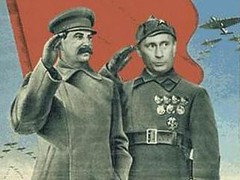I already noted that the significant dilution of the stimulus bill, when it was only going to be rejected unanimously by the House GOP anyway, drove some people up the wall. “Now that [Obama has] offered concrete concessions to the GOP only to have them publicly throw them back in his face, there simply isn’t any super-secret strategy that can [..] make it all make sense,” wrote Stephen Suh angrily at Cogitamus. Why bother even striving for compromise?
This question will get more acute by the day, as a recent post by Kevin Drum illustrates. He reports on the Obama administration’s push to extend the February 17 deadline for TV stations to switch from analog to digital transmissions. Not exactly a hotly partisan issue, right? The Senate promptly arrived at a bipartisan bill – which it passed unanimously. Every Republican agreed. But then the bill went to the House.
Only 22 House Republicans voted in favour. 155 voted against it. Drum: “100% of Senate Republicans voted in favor but 90% of House Republicans voted against. Shazam! Apparently the House GOP caucus really has decided to blindly stonewall everything Obama wants, no matter what.” He posits: “This is even more of a wakeup call than the vote on the stimulus bill.”
Right. The House GOP leadership is startlingly open about its intentions too, observes Dan at Bleakonomy. It will block and obstruct whatever comes its way, so Republicans can freely blame the Democrats for everything when the economy hasn’t recovered yet in six months. Yes, six months – if things haven’t improved in six months, the Republicans intend to say that it’s all the Dems’ fault and that the stimulus “didn’t work” because they “didn’t have the input in this”.
Of course, the current crisis is turning out to be the worst in almost three decades and is guaranteed to have an impact lasting (much) longer than six months, so … GOP profit!
Yet still there are valid reasons not to come down on Stephen’s side of the argument … yet. (I mean, apart from the stimulus bill not actually being all that bad.) The obvious one is the enormous contrast between House and Senate Republicans on the TV bill. If the Senate GOP shows any remotely similar divergence from the House Republicans’ obstruction course on the stimulus as well, Obama’s strategy may still come to “make sense”.
 Then there’s the question of strategy. I already linked to Josh Marshall’s argument that offering the Republicans significant compromises, only for them to reject everything anyway, will help to brand them as the party of ‘no’. Which will marginalise them even further in 2010 so the Dems can go the long haul. Kevin Drum links to more evidence on that count too: a poll conducted by Democracy Corps on January 14-19.
Then there’s the question of strategy. I already linked to Josh Marshall’s argument that offering the Republicans significant compromises, only for them to reject everything anyway, will help to brand them as the party of ‘no’. Which will marginalise them even further in 2010 so the Dems can go the long haul. Kevin Drum links to more evidence on that count too: a poll conducted by Democracy Corps on January 14-19.
Continue Reading »







 Most news reports last week on the double political murder in Moscow
Most news reports last week on the double political murder in Moscow 
